
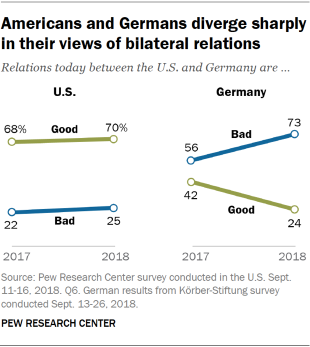
Americans and Germans have vastly different opinions of their bilateral relationship, but they tend to agree on issues such as cooperation with other European allies and support for NATO, according to the results of parallel surveys conducted in the United States by Pew Research Center and in Germany by Körber-Stiftung in the fall of 2018.
In the U.S., seven-in-ten say that relations with Germany are good, a sentiment that has not changed much in the past year. Germans, on the other hand, are much more negative: 73% say that relations with the U.S. are bad, a 17-percentage-point increase since 2017.
Nearly three-quarters of Germans are also convinced that a foreign policy path independent from the U.S. is preferable to the two countries remaining as close as they have been in the past. But about two-thirds in the U.S. want to stay close to Germany and America’s European allies. Similarly, while 41% of Germans say they want more cooperation with the U.S., fully seven-in-ten Americans want more cooperation with Germany. And Germans are about twice as likely as Americans to want more cooperation with Russia. All this is happening against a backdrop of previously released research showing a sharply negative turn in America’s image among Germans.
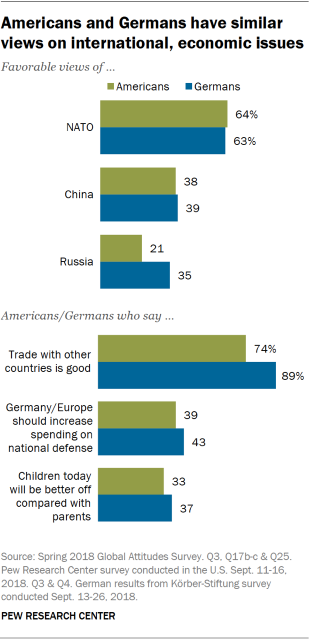
Americans, for their part, are politically divided over tariffs on Germany (while Germans overwhelmingly support retaliatory tariffs), and few Americans see Germany as the most or second-most important foreign policy partner. About a third of Germans still rank the U.S. as one of their most important partners (35%), second only to France (61%).
Despite the differences of opinion on the overall relationship, Americans and Germans have remarkably similar views when it comes to attitudes toward Russia and China, as well as opinions about the economy.
Both Germans and Americans still think highly of NATO, and Germans have become more inclined to believe their country must increase spending on defense. Americans and Germans also want to cooperate more with France, the United Kingdom and China.
Americans and Germans share similar opinions on economic issues. People in both countries say that trade with other countries is good, but there is less agreement on the specific benefits of trade. And there is an overarching pessimism in each country about the economic future for children and the financial progress of average citizens over the last 20 years.
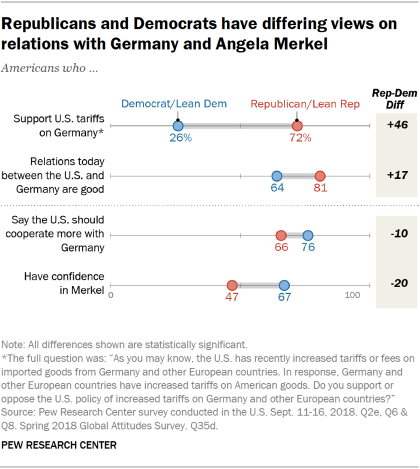 There is a distinct partisan divide in the U.S. on many aspects of the American-German relationship. For example, Republicans and Republican-leaning independents are 46 percentage points more likely than Democrats and Democratic-leaning independents to support the U.S. policy of tariffs on imported goods from Germany and other European countries. Republicans are also more likely to characterize America’s relationship with Germany as good. Democrats, on the other hand, are more likely than Republicans to say the U.S. should cooperate more with Germany and more readily name Germany as a top foreign policy partner.
There is a distinct partisan divide in the U.S. on many aspects of the American-German relationship. For example, Republicans and Republican-leaning independents are 46 percentage points more likely than Democrats and Democratic-leaning independents to support the U.S. policy of tariffs on imported goods from Germany and other European countries. Republicans are also more likely to characterize America’s relationship with Germany as good. Democrats, on the other hand, are more likely than Republicans to say the U.S. should cooperate more with Germany and more readily name Germany as a top foreign policy partner.
On confidence in German Chancellor Angela Merkel, there is a 20-percentage-point partisan gap, with Democrats expressing more confidence in the German leader.
These are among the major findings from a Pew Research Center survey conducted among 1,006 American adults from Sept. 11-16, 2018, a Körber-Stiftung survey conducted among 1,002 German adults from Sept. 13-26, 2018, and from the Spring 2018 Global Attitudes Survey in the U.S. and Germany, conducted among 2,501 adults from May 14-June 30, 2018.
Americans want more cooperation with Germany, but Germans don’t reciprocate
On the international stage, majorities of Americans and Germans align on their mutual desire for more cooperation with the United Kingdom, France and China. On Russia, however, differences emerge. Roughly one-third of Americans (35%) want more cooperation with Russia, while nearly twice as many Germans (69%) want the same. There are also stark contrasts between the U.S. and Germany on collaboration with each other: 70% of Americans say they want more cooperation with Germany, but only 41% of Germans share this sentiment toward the U.S. Rather, 47% of Germans want less cooperation with the U.S.
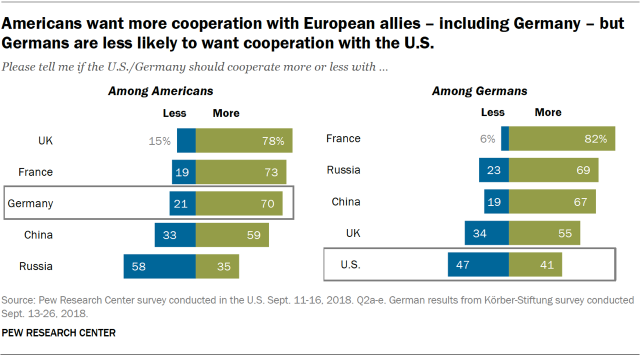
Opinion on U.S. cooperation with international allies is also divided by partisan affiliation. Democrats generally want to work more with other countries than Republicans do, except for Russia. To illustrate this point, 70% of Democrats want more cooperation with China compared with 48% of Republicans. However, Republicans are 13 percentage points more likely than Democrats to want increased cooperation with Russia, an issue shaped by partisan debates over Russian interference with the 2016 election.
 Along with Democrats, men (76%) are more likely than women (65%) to want increased cooperation with Germany. Those with at least a completed college education or more (81%) agree with this sentiment more than those with some college education (67%) or a high school education or less (63%).
Along with Democrats, men (76%) are more likely than women (65%) to want increased cooperation with Germany. Those with at least a completed college education or more (81%) agree with this sentiment more than those with some college education (67%) or a high school education or less (63%).
In Germany, backers of Angela Merkel’s center-right coalition of the Christian Democratic Union (CDU) and Christian Social Union (CSU) rank U.S. cooperation last vis-à-vis the other countries evaluated on desired levels of cooperation. Views of collaboration with the U.S. varies greatly by party: 48% of CDU/CSU supporters want more cooperation with the U.S., while 52% of their center-left coalition partner the Social Democratic Party (SPD) want the same. Among supporters of the Left Party (Die Linke), 23% want more cooperation with the U.S., while 37% of backers of the Greens (Grüne) want the same.
Who do Americans and Germans see as their top foreign policy partners?
Roughly one-in-ten Americans name Germany as the United States’ most or second-most important foreign policy partner, while about one-third of Germans say the U.S. is a top foreign policy partner. For Americans, the UK, China and Canada rank as the most important partners for foreign policy. Roughly six-in-ten Germans name France as their most or second-most important ally for foreign policy, followed by the U.S. and Russia.
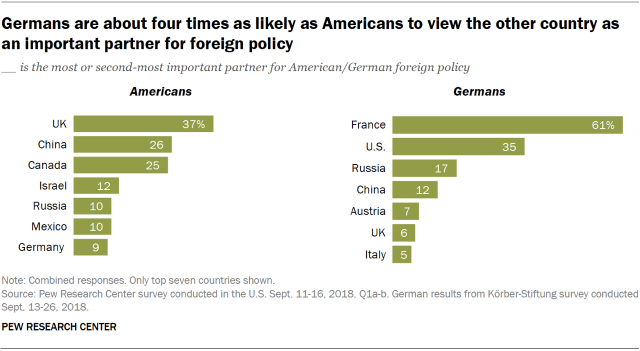
There is a partisan gap regarding countries Americans see as important foreign policy partners, with Democrats more likely than Republicans to name Germany as one of the two most important partners for the U.S.
And while the UK and China rank in the top three positions across party lines, more Republicans (25%) than Democrats (5%) name Israel as a top foreign policy partner for the U.S. There are also significant partisan differences in opinion on views about Canada and Mexico.
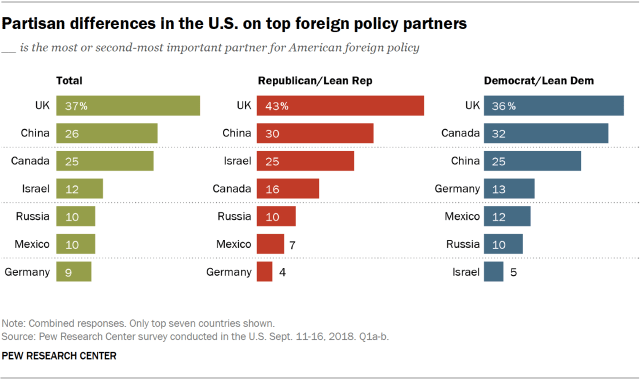
Older Americans (ages 50 and older) are more likely to name the UK as a top foreign policy partner than younger Americans (ages 18 to 29). This pattern is reversed for China, which younger Americans are more likely to say is a top foreign policy partner.
About six-in-ten Germans name France as one of their country’s top two foreign policy partners, while roughly one-third name the U.S. These results are consistent across a range of political parties: Supporters of the CDU/CSU, their coalition partner the SPD, the Left Party and the Greens all rank France and the U.S. as Germany’s most important foreign policy allies.
Russia and China rank third and fourth, respectively, as the most important foreign policy partner across selected political parties except for the Greens, where these countries’ rankings are reversed.
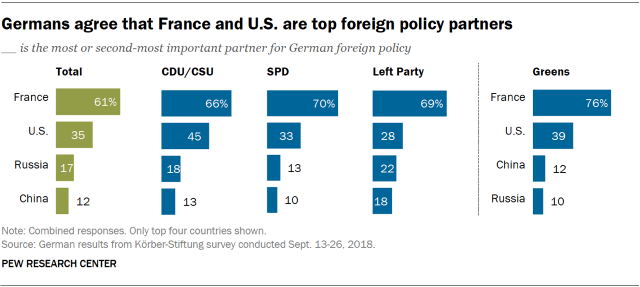
Germans want more independent foreign policy, but both publics rate NATO positively
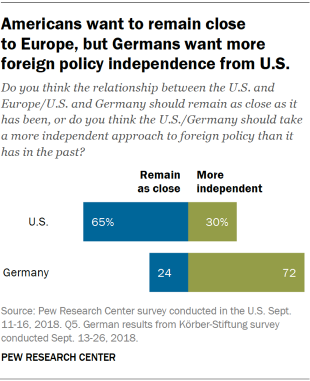 When asked about the future of U.S.-European relations, nearly two-thirds of Americans say they would like relations to remain as close as they have been (65%), while 30% think the U.S. should take a more independent approach to foreign policy. However, when Germans were asked specifically about U.S.-German relations, roughly seven-in-ten (72%) said they would like their country to pursue a more independent approach.
When asked about the future of U.S.-European relations, nearly two-thirds of Americans say they would like relations to remain as close as they have been (65%), while 30% think the U.S. should take a more independent approach to foreign policy. However, when Germans were asked specifically about U.S.-German relations, roughly seven-in-ten (72%) said they would like their country to pursue a more independent approach.
Democrats (77%) are more likely than Republicans (51%) to say the U.S. should remain as close as it has been with Europe on foreign policy.

Despite their differences, Americans and Germans are both favorable toward the North Atlantic Treaty Organization (NATO). This convergence follows findings from Pew Research Center and Körber-Stiftung in 2017 in which roughly half of Americans said NATO was doing too little to help solve global problems, while about the same proportion of Germans said the organization was doing the right amount. NATO favorability continues to remain high in both countries even after U.S. President Donald Trump and Chancellor Merkel publicly clashed over defense spending and Russian influence at the NATO summit in Brussels in July 2018.
The two publics have moved in opposite directions regarding defense spending, which has been a contentious issue in relations between the U.S. and its NATO allies. The share of Americans who say their European allies should increase their defense spending dropped by 6 percentage points between 2017 and 2018, while the share saying European allies should keep their spending about the same rose 9 points. Germans, on the other hand, saw an 11-point increase in the share saying they wanted their own country to spend more on national defense.
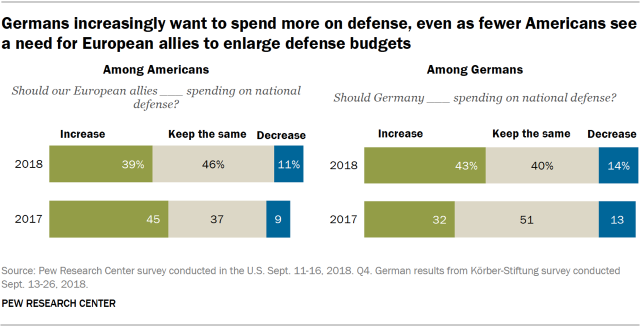
In the U.S., Republicans (59%) are more likely than Democrats (27%) to say European allies should increase spending on national defense. American men (46%) are more supportive of increased spending than women (32%) are.
In terms of political affiliation, 40% and 44% of the CDU/CSU and SPD coalition partners, respectively, want increased spending, compared with 28% of Left Party backers and 29% of Greens supporters. In Germany, 47% of men say the country should spend more on national defense, while 39% of women agree.
German and American views of the world
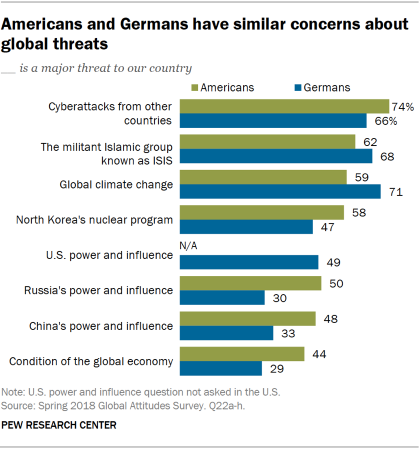 When asked about the top international threats facing their countries, majorities of Americans and Germans say cyberattacks from other countries, the Islamic militant group known as ISIS and global climate change are major concerns.
When asked about the top international threats facing their countries, majorities of Americans and Germans say cyberattacks from other countries, the Islamic militant group known as ISIS and global climate change are major concerns.
Americans are slightly more concerned about cyberattacks (74% major threat) than are Germans (66%), and Germans are more likely to consider climate change as a major concern (71%) compared with Americans (59%). Americans also are generally more concerned about North Korea’s weapons program, the power and influence of Russia and China and the condition of the global economy. (For more information on global views about cybersecurity, including among Americans and Germans, see the Center’s report “International Publics Brace for Cyberattacks on Elections, Infrastructure, National Security.”)
Germans’ sentiment that U.S. power and influence is a major threat to their country has been rising in recent years. In 2013, only 19% of Germans said the U.S. was a major threat, but that rose to 35% in 2017, after the election of Donald Trump, and to 49% in 2018. Only around a third of Germans express similar concerns about China (33%) and Russia (30%).
Roughly one-in-three Germans (35%) have a positive view of Russia, compared with only about one-in-five Americans. Ratings for Russia in both the U.S. and Germany have fallen sharply since 2011, when massive protests swept across Russia after accusations of ballot-rigging in the December parliamentary elections. They reached a low point in 2014 after the annexation of Crimea (19% favorable in both countries).
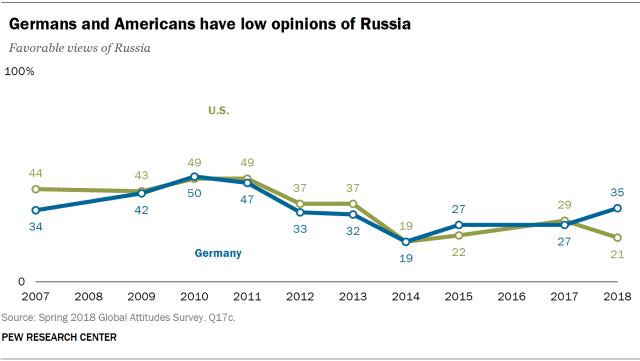
While opinion of Russia is low in both countries, Republicans in the U.S. are somewhat more favorable toward the country than are Democrats (27% favorable vs. 16%). And supporters of Alternative for Germany (AfD) are much more likely to see Russia favorably (50%) than are those with an unfavorable view of the right-wing party (31%). And Germans living in the East are 16 percentage points more favorable toward Russia than those living in the West (48% vs. 32%).
Germany and the U.S. also have similar attitudes toward China. Roughly four-in-ten in each country have a favorable view of the Asian economic giant. Over the past decade and a half, Americans’ opinions of China have generally been more favorable than Germans’ views, but a rise in German sentiment over the past few years and a decline in American opinions have pulled attitudes closer together.
As with views of Russia, German views of China differ by region. About half of those in the East have a favorable view toward China (49%), while only 39% of those in the West have a positive opinion of Germany’s largest importer.
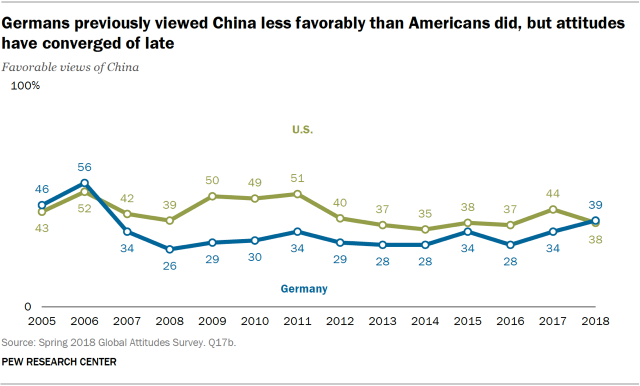
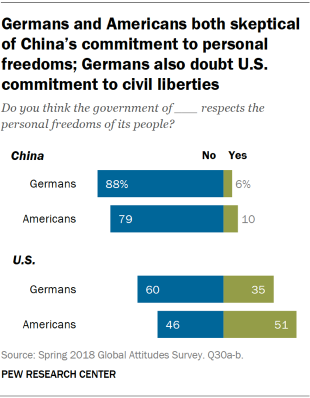 Germans and Americans are also skeptical of China’s human rights record. Overwhelming majorities in each country say the Chinese government does not respect the personal freedoms of its people. This has been true for many years.
Germans and Americans are also skeptical of China’s human rights record. Overwhelming majorities in each country say the Chinese government does not respect the personal freedoms of its people. This has been true for many years.
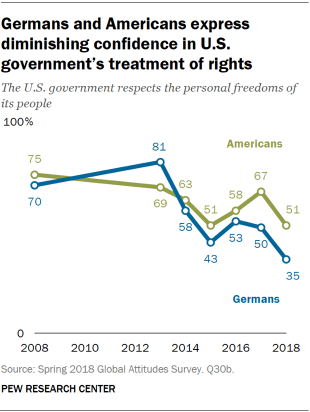 However, since 2013, there has been a steady decline in both Germany and America in the percentage of those saying the U.S. government respects the personal freedoms of its people. In that year, 81% of Germans and 69% of Americans said the U.S. government respected the personal freedoms of its people. But after multiple scandals involving the exposure of National Security Agency eavesdropping, confidence in American respect for civil liberties began to decline. Now, just 35% of Germans and 51% of Americans hold this view.
However, since 2013, there has been a steady decline in both Germany and America in the percentage of those saying the U.S. government respects the personal freedoms of its people. In that year, 81% of Germans and 69% of Americans said the U.S. government respected the personal freedoms of its people. But after multiple scandals involving the exposure of National Security Agency eavesdropping, confidence in American respect for civil liberties began to decline. Now, just 35% of Germans and 51% of Americans hold this view.
Americans and Germans diverge on who is the world’s leading economic power. Roughly half of Americans (49%) name the U.S. as the world’s economic leader, while only 19% of Germans say the same. Over half of Germans (53%) say China is the leading economy. A further 21% of Germans say the countries of the European Union are the world’s top economic power, while only 7% of Americans say this.

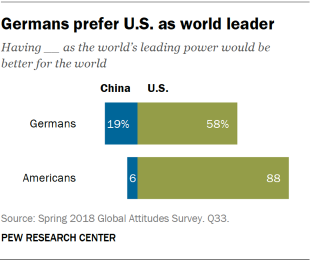 Despite their mixed feelings toward American power, Germans clearly prefer the U.S. as the world’s leading power over China. Nearly six-in-ten Germans say having the U.S. as the top global power would be better for the world, with only 19% saying this about China. However, 17% in Germany volunteer “neither” when asked the question.
Despite their mixed feelings toward American power, Germans clearly prefer the U.S. as the world’s leading power over China. Nearly six-in-ten Germans say having the U.S. as the top global power would be better for the world, with only 19% saying this about China. However, 17% in Germany volunteer “neither” when asked the question.
U.S. image in Germany
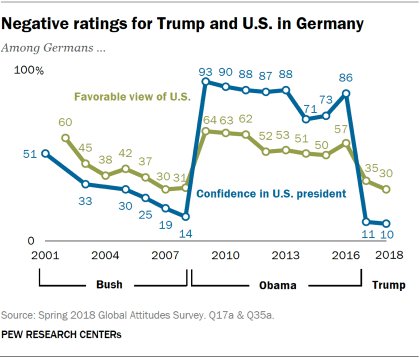 America’s current image in Germany is generally poor, but that has not always been the case. As recently as 2016, 86% of Germans had confidence in then-President Barack Obama and 57% had a favorable view of the United States.
America’s current image in Germany is generally poor, but that has not always been the case. As recently as 2016, 86% of Germans had confidence in then-President Barack Obama and 57% had a favorable view of the United States.
With the election of Donald Trump, positive views of the U.S. and confidence in the U.S. president plummeted. As of 2018, only one-in-ten Germans had confidence in Trump and three-in-ten held a favorable view of the U.S., levels of antipathy not seen since the end of the George W. Bush administration.
Supporters of the right-leaning anti-immigration party AfD are more favorable toward the U.S. than those who do not support AfD (43% vs. 26%, respectively), and they are also more likely to express confidence in President Trump. People who look favorably on other German parties tested are more in line with the general population on U.S. image and confidence in Trump.
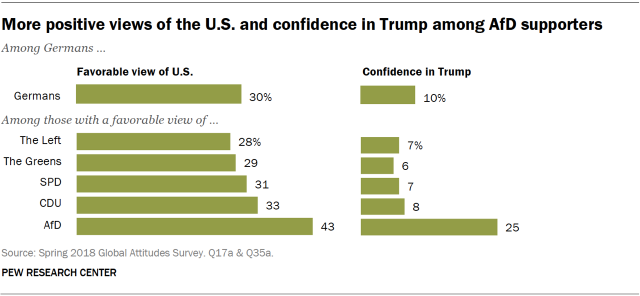
While there is no corollary question asked in the U.S. about favorable views of Germany, on a 0-100 feeling thermometer, where 100 is “warmest,” Germany gets a mean rating of 59 from the American public, higher than Mexico and India (51) but lower than Japan (61), the UK (66) and Canada (71). And a majority of Americans (55%) have confidence in Chancellor Merkel to do the right thing regarding world affairs.
American and German views on the economy, trade and migration
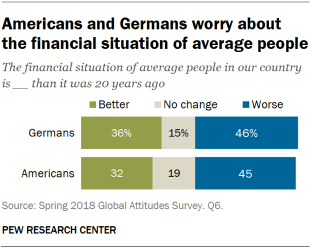 Despite their differences, Americans and Germans have remarkably similar views on the fundamentals of the economy and the overall benefits of trade. There are differences, however, over tariffs and migration.
Despite their differences, Americans and Germans have remarkably similar views on the fundamentals of the economy and the overall benefits of trade. There are differences, however, over tariffs and migration.
When asked about the financial situation of average people in their country, roughly equal pluralities of Germans and Americans say it is worse than it was 20 years ago (46% and 45%, respectively). And only about a third in each country believe the financial situation of ordinary people is better.
In the U.S., 48% of Republicans and Republican-leaning independents say the finances of average people are better, compared with only 22% of Democrats and Democratic leaners. Germans who back the AfD are much more likely than those who do not support the party to say that people are worse off compared with 20 years ago (64% vs. 42%).
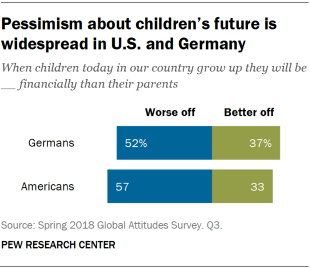 There are also corresponding levels of pessimism about children’s financial future in each country. Roughly half or more in both Germany and the U.S. say children will be worse off financially when they grow up than their parents were. And only about third in each country say children will be better off.
There are also corresponding levels of pessimism about children’s financial future in each country. Roughly half or more in both Germany and the U.S. say children will be worse off financially when they grow up than their parents were. And only about third in each country say children will be better off.
When it comes to trade, in principle, overwhelming majorities in Germany and the U.S. say increased business ties and trade with other countries is good for their country. And both Americans and Germans believe free trade with other countries is generally beneficial to them personally: 68% of Americans say this, while 53% of Germans agree.
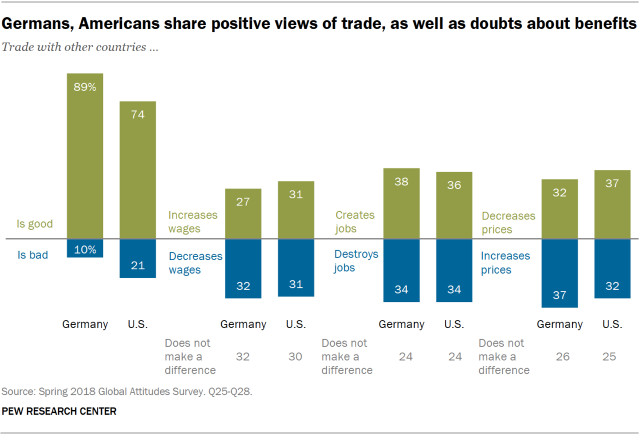
But on the specific benefits of trade, Germans and Americans are less convinced. For example, only about three-in-ten Germans and Americans say that trade increases wages. Just under four-in-ten in each country say trade with other countries creates jobs. And 32% in Germany and 37% in the U.S. say trade decreases prices, which is supposed to be one of the primary benefits of international trade.
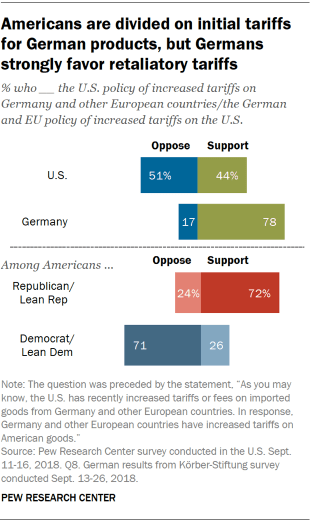 In May 2018, the Trump administration’s tariffs on European steel and aluminum went into effect. In response, Germany and its European Union allies placed tariffs on American goods, ranging from bourbon to motorcycles.
In May 2018, the Trump administration’s tariffs on European steel and aluminum went into effect. In response, Germany and its European Union allies placed tariffs on American goods, ranging from bourbon to motorcycles.
Among Americans, there are sharp divisions on this policy. About half (51%) oppose the initial tariffs, while 44% support the measures. But almost three-quarters of Republicans (72%) support Trump’s EU tariffs while about seven-in-ten Democrats (71%) oppose them.
In Germany, about eight-in-ten (78%) support the retaliatory tariffs. There are minimal differences by party in Germany on this question, as most agree with the policy across the political spectrum.
Finally, on the topic of immigration, Americans and Germans diverge somewhat about whether they want more, less or about the same level of immigration to their country. A plurality of Americans want to keep immigration levels about the same as they have been, with 24% wanting more immigrants in their country and 29% wanting fewer immigrants or none at all (“None” is a volunteered category).
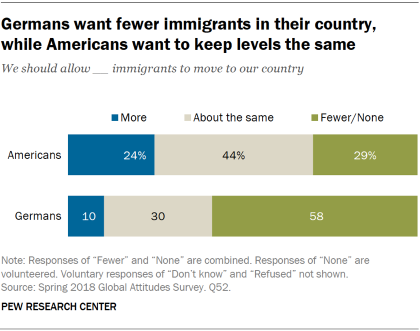
However, Germans are much more opposed to more immigration (making them more aligned with other nations asked about this issue), with a 58% majority saying that they want fewer or no immigrants in their country. Only one-in-ten want more immigrants.
In the U.S., those on the left are much more likely to say they want more immigration (46%) than those on the ideological right (10%). Similarly, Germans on the left are more likely to want immigration to remain about the same (49%), while those on the right favor fewer immigrants (77%).
Both Germans and Americans are very supportive of high-skilled immigration. Roughly eight-in-ten in both countries support encouraging highly skilled people to immigrate and work in their countries. This holds even for people who oppose allowing more people to immigrate into their countries.
Finally, when it comes to emigration, Germans and Americans are generally not worried about it as an issue (33% and 38%, respectively, say people leaving their country for jobs in other countries is a problem).


